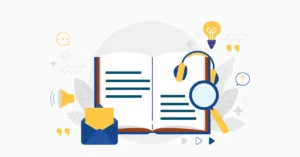
IGCSE English as a Second Language: Listening, Writing, and Speaking
Preparing for your IGCSE English as a Second Language (ESL) exam can feel daunting. You are not just learning grammar
Learn how to write step-by-step answers, and score A* in your exam!

Announcement: Cambridge IGCSE, O Level and AS & A Level June 2025 past papers are now available.
A summary is a shortened version of a passage containing the key points in as few words as necessary. The summary exercise requires the ability to identify the main ideas, express them in one’s own words, and arrange them in a logical sequence, all while adhering to a word limit.
Content. Answer directly the question and focus on the relevant points only. Use as much material as possible; while exercising caution towards any irrelevant details. Take points directly from the passage and avoid repeating similar points, even if they were mentioned twice.
Your summary must be supported by references and directly connected to the passage. Adding facts or opinions is not suggested since this exercise is meant to summarise, not add to the original ideas. You will only obtain content marks when you provide the right content.
Language. Write your summary in your own words as far as possible. Although the message must be the same, the wording must be different. The replaced words must convey the essence of the point. Only change the words when appropriate. Therefore, there is no need to find synonyms for technical objects, e.g., solar heaters.
Lifting a few words is acceptable if it shows evidence of understanding and focuses on key details. But avoid over-lengthy lifting and quoting straight from the passage. Find precise words to use and vary your choices.
Writing Style. Express the key points clearly, succinctly, and fluently using an impersonal and formal writing tone. Connect your ideas into a paragraph to organise and sequence points cohesively. Try to use complex sentences instead of simple or compound structures, and ensure that you use correct spelling, punctuation, and grammar.
Avoid any introductions and conclusions, and instead, begin your summary with the exact wording of the question. Then, do not include examples, repetition, direct speech, figurative language, and minor details in your summary. Lastly, ensure that your ending is strong and impactful.
Word Limit. Always write your summary within the word count, as this exercise assesses the ability to write concisely. There are no penalty marks for writing more or less. However, it may be self-penalising to write more than suggested. Going over the word limit implies poor structure or unclear ideas. On the other hand, writing way too less than the limit may mean the response does not have sufficient coverage. For example, if the question requires 200 to 250 words, but you only provide 180 words, there is a chance that you do not include sufficient points.
Before the exam, check how many words you write on a line; then, you’ll know approximately how many lines you will need. Lastly, do not write beyond the lines given to avoid your answers not fitting into the scanned screen.
Join 62,169 (and counting) IGCSE & AS/A Level subscribers who've taken our insanely valuable FREE email courses. Learn exam tips & score A* in your exam!
| Prefix | Meaning | Examples |
|---|---|---|
| anti- | against/opposed to | anti-government, anti-racist, anti-wat |
| auto- | self | autobiography, automobile |
| de- | reverse or change | de-classify, decontaminate, demotivate |
| dis- | reverse or remove | disagree, displeasure, disqualify |
| down | reduce or lovwe | downgrade, downhearted |
| extra- | beyond | extraordinary, extraterrestial |
| hyper | extreme | hyperactive, hypertension |
| il-, im-, in-, ir- | not | illegal, impossible, insecure, irregular |
My daughter got an A*
“My daughter got an A* for her English First Language! Skolatis gave her the confidence she needed.”
~ Carrie (Malaysia)
In 2024, Cambridge IGCSE removed the summary task from its English as a Second Language Reading and Writing paper.
Find out in our A* Model Answers. Copy the style and score A*!
Come join our A* revision courses that are designed based on proven A* scoring system, move up your level and reach your A*!
* Note: Some relevant info taken from CIE.
Join 62,169 (and counting) IGCSE & AS/A Level subscribers who’ve taken our insanely valuable FREE email courses. Learn exam tips & score A* in your exam!
Kher
Kher
Auret Murima
Auret Murima
Simi P
Simi P
Nihar Narsana
Nihar Narsana
Harsha
India
Harsha
India
Ethan
Ethan
sd
sd
Isa Jehanzeb
United Kingdom
Isa Jehanzeb
United Kingdom
Roro
Roro
Akshaya S T
Singapore
Akshaya S T
Singapore

Preparing for your IGCSE English as a Second Language (ESL) exam can feel daunting. You are not just learning grammar

Choosing the right educational pathway for your child is one of the most significant decisions a family can make. In

The IGCSE English First Language exam places a strong emphasis on creative writing, with writing descriptive and narrative essays being

In the IGCSE English First Language Directed Writing task, you’ll be required to either write a speech, letter, or article
89 responses
thanx a lot but how can i download this material?
Hello Gamalhassan,
Unfortunately, you are not permitted to copy any of our posts. You are most welcome to come back to our website to read all the posts. We thank you for your cooperation.
You may be interested to purchase our exam model answers. Our model answers will show you what is an A* answer like for the writing questions/exercises:
https://www.skolatis.com/igcse-exam-resources/
Hi I?m taking my olevel English exam this May . I know this is an igcse center but it?s the same English so I guess it wouldn?t matter me referring to these notes as we already study from igcse textbooks .
Currently in summarry writing I get full marks for content points but only recieve 4/10 for the summary. I don?t really understand what?s the problem in my writing. Is there any way for me to submit one of my summaries along with the question for correction and guidance on what aspects i need to improve ?
Hi Lillly,
Thank you so much for your trust. We?ve added O-level papers in our Mark Your Paper service. Kindly follow the step-by-step instructions here: https://www.skolatis.com/mark-your-papers/
in taking exams for note making I always find it hard to find the answers since there are many look-alike answers and I can’t differentiate between the answers can you please help and also for a summary like if it says write 100-150 words can we write for example less than 100 words but it could make a great summary
Hi Aya,
For note taking, you will need to focus on and select the specific ideas or details relevant to the question set. Make sure that your points are clear and show the examiner what specific idea you have selected. You do not need to use your own words for this part of the question, but you should make sure that the points you record are clear.
On the other hand for summary writing, the important point is not to go beyond the word limit. However, writing way too less than the limit may mean the response does not have sufficient coverage. You need to show evidence of clear and concise summary style throughout, with good focus on the points you have identified in 3(a) Notes. The examiners are looking to credit candidates who can write a cohesive piece of writing, with ideas presented in a logical sequence.
You may be interested to purchase our exam model answers. Our model answers will show you what is an A* answer like for the writing questions/exercises:
https://www.skolatis.com/igcse-exam-resources/
hello ,
this is the first time I’m taking igcse , I’m doing my AS level . I’m finding difficulty in my subjects , are there any classes or tips offered on the website ??
Hi Casy,
Thank you for your interest. Unfortunately, we are still in the midst of creating A Level revision courses.
Here are some revision tips for you:
Start as early as possible.You should start doing your revision based on the latest syllabus: (https://www.skolatis.com/cambridge-international-as-a-level-syllabuses/) and practice with the latest past exam papers (https://www.skolatis.com/as-a-level-past-exam-papers/). Start with the latest paper as they have the newest syllabus format and continue with the older one date back from 5 to 10 years. Then, revise on the most common mistake you always seem to make.
Where could i get the grade boundaries?
BTW love your website!!
Hi Rachit,
Thank you for your kind words. You may refer to past papers https://www.skolatis.com/cambridge-igcse-past-exam-papers/ for the previous grade threshold.